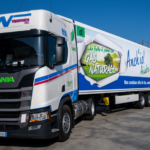Avv. Elisabetta Mizzau is a highly experienced professional who has successfully combined her passion for law with a strong commitment to the local territory and its unique characteristics. Born and raised in a family with a strong international tradition, thanks to her father, a member of the European Parliament, she had the opportunity from a young age to view the world from a different perspective, developing a solid legal education and an intense professional career. Her law firm in Udine is a prominent entity highly specialized in corporate and banking law, but her true vocation lies in the agro-food sector, a field she considers fundamental for the economic growth of Friuli and the entire Northeast.
Roberta Imbimbo
Avv. Mizzau, what led you to choose Friuli as the base for your legal practice, and how does this land, with its geographical position and characteristics, integrate with the specialized consulting you offer to local businesses, particularly in the agricultural sector?
Friuli represents a land that unites tradition with modernity, a natural connection point between Western and Eastern Europe. A region with a diverse entrepreneurial fabric, it requires highly specialized legal consulting. For this reason, I decided to establish my practice in the heart of this land, to support local businesses in a concrete and competent manner, paying particular attention to the needs of the agricultural sector, which in Friuli is a fundamental economic pillar. The challenges that agricultural businesses are facing are numerous, from difficulties in accessing European funds to issues related to climate change and political uncertainties in agriculture.
The agro-food sector, one of the most important and distinctive in Friuli Venezia Giulia, requires advanced legal consulting that goes well beyond mere contract drafting.
Absolutely! Agricultural businesses need not only protection of their properties and products but also a long-term strategic evaluation. My consulting aims to help businesses understand where they want to go and how to do it, leveraging growth opportunities and improving their economic and asset sustainability. When a new professional challenge arises, I start with a thorough analysis of the case (and/or the company), assessing both the economic/asset and legal situation, then proceed with an evaluation of the specific potentials and criticalities to develop every possible future scenario for those I assist, without any scenario being excluded. My primary goal is, of course, to work towards building greater entrepreneurship in agriculture, even assisting entrepreneurs in the sector with exports, despite the current issue of tariffs. Europe also offers numerous non-repayable contributions, but the availability of these funds can create confusion, especially when inexperienced consultants manage these resources. Expert legal support is essential to prevent businesses from falling into traps that could compromise their financial stability: while agricultural incentives are a vital engine for the growth and innovation of agricultural enterprises because they offer the opportunity to invest in cutting-edge technologies, improve environmental sustainability, and diversify production, it is also crucial to rely on experienced professionals. In Friuli, several entities have attempted to promote spirulina farming, an algae that grows in salt lakes. Many have invested in this activity, but the results have been disastrous. In such situations, an experienced professional must intervene to protect the company. The legal advisor’s role becomes crucial in these cases, providing guidance on risk assessment, regulatory compliance, and potential contractual obligations, ensuring that businesses are protected from unforeseen liabilities.
What are the main challenges that Friuli’s wine companies are currently facing, and how can specialized legal consulting support them in managing these difficulties, especially in a context of increasing globalization and competition?
Northeastern Italy, particularly Friuli, is known for its winemaking tradition, with a strong presence of cooperatives producing fine wines. However, this sector is also experiencing difficulties: rising costs, declining exports, and challenges in accessing credit are impacting company balances. The greatest challenge for these businesses is the need to remain competitive while maintaining a high level of product quality, all while facing increasingly global competition. Winemaking companies are structured as industrial entities but possess unique characteristics that require tailored legal consulting, with in-depth knowledge of agricultural legislation and the ability to respond to market dynamics. The wine sector is continuously evolving. We might witness consolidation, with large groups acquiring more labels and creating real clusters, highlighting new opportunities that could arise, while maintaining a strong focus on product quality and authenticity.
How can agricultural companies address the growing water scarcity, and what legal and strategic measures can a consultant take to help them manage this crisis? How can the establishment of business networks promote collaboration among agricultural companies and contribute to environmental sustainability and their long-term survival?
One of the most urgent challenges facing the agricultural sector is the unprecedented water crisis affecting Italy and much of the world. It is expected that agricultural water scarcity will increase in over 80% of cultivated land by 2050. Water management thus becomes a central theme for the survival of agricultural businesses, which will need to adopt techniques to retain rainwater in the soil and reduce consumption in the industry. Agricultural companies must review their practices, adapting to a context where water is becoming an increasingly valuable resource. Environmental sustainability is not just a value but a necessity for their survival. In this scenario, the lawyer’s role is fundamental not only in managing legal issues but also in building new business networks that can promote collaboration among companies and create synergies capable of facing global challenges.
In conclusion, how do you see the future of agriculture in Friuli?
Friulian agriculture faces challenging obstacles but also extraordinary opportunities. To face them successfully, businesses need legal consulting that can thoroughly analyze their situation, identify criticalities, and propose concrete solutions. My commitment is aimed at building a future where agricultural entrepreneurship can grow and thrive, with a strong focus on sustainability and innovation. The agro-food sector is destined to be a fundamental engine for the regional and national economy, but to ensure its success, a strategic, integrated, and professional approach is necessary. My Legal Studio, with its experience, continues to be a point of reference for all companies wishing to navigate the often turbulent waters of the agro-food market competently

























































